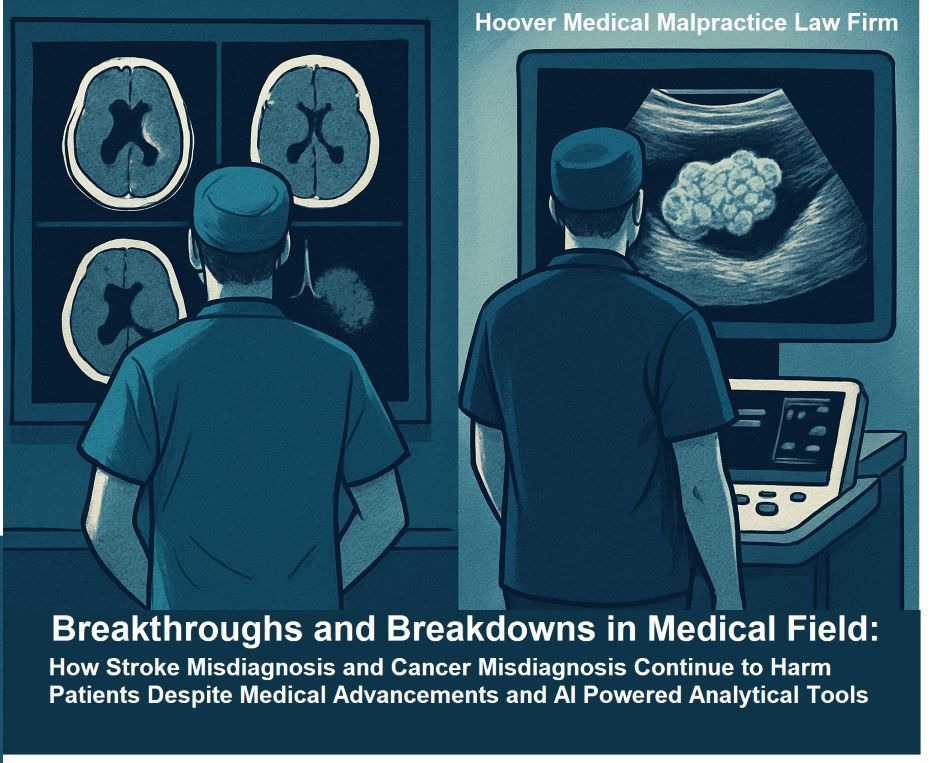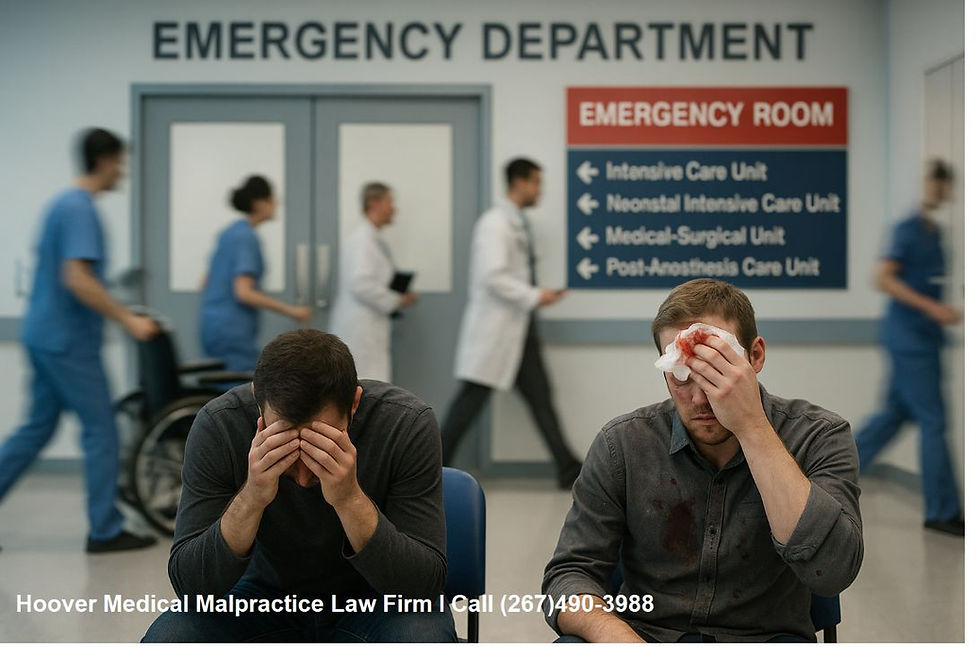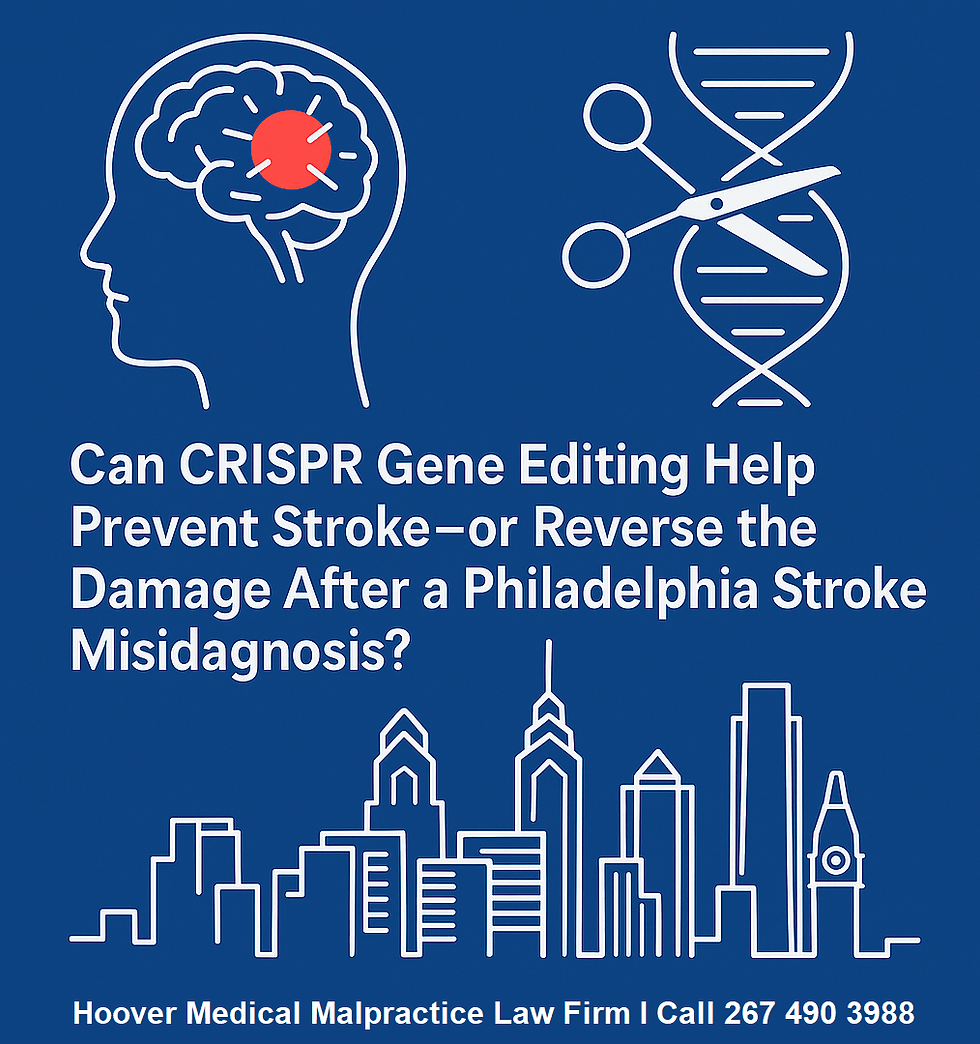How Stroke Misdiagnosis and Cancer Misdiagnosis Continue to Harm Patients Despite Medical Advancements and AI Powered Analytical Tools
- Dave Hoover
- Aug 8, 2025
- 6 min read

This Article at a Glance:
What are the newest tools helping diagnose strokes earlier—and why are they still not saving lives in every case?
Can AI detect cancer years before symptoms appear, and what are the dangers if doctors ignore the signs?
Chemotherapy drugs under fire.
What hidden heart and stroke risks can breast mammograms now detect—and how does that impact patient care?
Overdiagnosis: Is your cancer diagnosis accurate, or were you overtreated? New concerns from mental health professionals raise alarms.
Expectations vs. Reality: Recent Developments in the Medical Field vs. Stroke Misdiagnosis and Cancer Misdiagnosis
At Hoover Medical Malpractice Law Firm, we are Philadelphia medical malpractice lawyers committed not only to legal advocacy but also to staying informed about cutting-edge medical research, treatments, and public health concerns. Our mission is to raise awareness and offer informed legal support to those harmed by systemic failures in healthcare. Every day, we represent clients devastated by medical negligence—especially those suffering from Philadelphia stroke misdiagnosis, cancer misdiagnosis, chemotherapy errors, and other medical malpractice cases.
This article is a carefully curated roundup of recent developments in the medical field related to strokes and cancer. These are two of the deadliest health conditions worldwide—and tragically, some of the most frequently misdiagnosed. As Philadelphia medical malpractice lawyers who also handle Philadelphia cancer malpractice claims, we hope this knowledge empowers readers to seek better care and know their legal rights. When missed diagnoses and treatment delays occur, the consequences can be catastrophic—but with the right information and support, you have options. Here’s what you need to know.
Discover hope through new treatments—and the harsh reality of Philadelphia stroke misdiagnosis and cancer misdiagnosis harming patients every day.
Stroke: The Unseen Threat and How Technology Aims to Prevent It
1. AI-Powered Tools Enhancing Early Stroke Detection
Artificial intelligence is rapidly changing the medical landscape, especially in neurology. AI systems are now being used to analyze brain scans and ECG results to detect stroke signs that even experienced physicians might miss. These tools show promise in enabling rapid, accurate stroke diagnosis, potentially saving critical time in emergency situations.
Yet, many hospitals—especially underfunded ones—haven’t adopted these technologies. As a result, patients continue to experience catastrophic delays, leading to long-term disability or death. We’ve represented numerous clients in Philadelphia stroke malpractice lawsuits where clear warning signs were overlooked by ER doctors. If AI tools can prevent this, we urge healthcare providers to implement them—and if you or a loved one suffered due to such a delay, you may have a Philadelphia medical malpractice case.
2. New Stroke Risk Factor: Lipoprotein(a) and Emerging Treatments
Lipoprotein(a), or Lp(a), is gaining attention as a silent but deadly stroke risk factor. It’s not part of routine cholesterol screenings, but elevated levels are now strongly linked to ischemic strokes. Clinical trials for new drugs like Pelacarsen and Lepodisiran show potential to lower Lp(a) and prevent strokes before they occur.
The sad reality is that traditional diagnostic practices often ignore this risk. If doctors fail to evaluate or treat this condition, they could miss a chance to prevent a life-altering event. Even cases where subtle indicators—like elevated Lp(a)—were ignored, leading to preventable strokes may be grounds for Philadelphia medical malpractice lawsuits. Ask your doctor about Lp(a) if you have a family history of cardiovascular disease.
3. AI-Enhanced MRI and CT Scans for Faster, More Accurate Stroke Diagnosis
Many patients are misdiagnosed in the ER simply because a radiologist misses subtle signs on a CT or MRI. AI-assisted image analysis is improving that process. Algorithms can identify blood clots, tissue damage, and ischemic changes within seconds—speeding up stroke diagnosis and treatment decisions.
But even with this technology, human oversight remains a weak point. As long as doctors continue to fail to review or correctly interpret AI-assisted scans, stroke patients will continue to suffer from diagnostic delays. If this has happened to your family, we can help hold providers accountable.
4. AI Mammogram Analysis Revealing Hidden Stroke Risks
This might surprise you—mammograms, typically used for detecting breast cancer, are now being analyzed with AI to reveal breast arterial calcifications. These calcifications are a marker for future stroke and cardiovascular events. This dual-use diagnostic potential could revolutionize preventive care for women.
Yet again, the danger lies in underuse and misinterpretation. If doctors miss these findings or fail to act on them, women may remain unaware of serious stroke risks. We’ve represented patients in Philadelphia stroke malpractice and Philadelphia medical error cases where early warning signs were ignored. Women especially should be vigilant and ask for comprehensive mammogram reports that include vascular assessments.
Cancer: New Hope, New Risks - and Why Vigilance Still Matters
5. Blood Tests That Detect Cancer Up to 3 Years Before Symptoms
Recent studies—including those funded by NIH—show that multi-cancer early detection (MCED) blood tests can spot signs of cancer up to three years before symptoms arise. These revolutionary tests analyze DNA fragments in the bloodstream to catch early-stage tumors.
But while the science is promising, implementation is uneven—and some doctors remain unaware or skeptical. We hope MCEDs will one day be routine—but until then, Philadelphia cancer misdiagnosis remains an enormous risk.
In many Philadelphia cancer misdiagnosis cases, patients are initially dismissed by doctors—even oncologists—who assure them their symptoms are insignificant, only for those same patients to later receive a late-stage cancer diagnosis, often with drastically reduced chances of survival. If you or your loved one experienced similar healthcare providers’ errors, you may be entitled to seek justice through the Philadelphia medical malpractice claim.
6. Generic Chemotherapy Drugs Are Failing Safety Tests
In a chilling development, investigations have shown that many generic chemotherapy drugs fail consistency and safety checks. Contamination, incorrect dosages, and degraded compounds are putting vulnerable cancer patients at risk. Despite FDA warnings, some healthcare providers continue to prescribe these flawed medications.
If you or your loved one received generic chemo that led to complications or a worsened prognosis, you may have grounds for a Philadelphia chemotherapy error or Philadelphia cancer malpractice lawsuit. Your legal rights include compensation for suffering caused by dangerous or improperly administered treatments.
7. Surge in Early-Onset Colorectal Cancer Prompts New Screening Guidelines
Colorectal cancer rates are rising sharply among adults under 50, prompting updated guidelines to start screenings at age 45—or earlier for high-risk individuals. Sadly, many young adults with symptoms are still misdiagnosed or brushed off.
We handle Philadelphia cancer misdiagnosis cases where early symptoms like rectal bleeding or abdominal pain were ignored by doctors. If you were told you were “too young for cancer,” only to later receive a colorectal diagnosis, this could constitute medical malpractice. Earlier screenings could save lives—but awareness is key.
Age is one of the most common factors in both Philadelphia stroke misdiagnoses and cancer misdiagnoses, as doctors often dismiss serious symptoms by assuming patients are too young to be seriously ill.
8. Mental Health Professionals Raise Alarm Over Philadelphia Cancer Overdiagnosis
A growing body of psychological and ethical research is now questioning the rise in cancer overdiagnosis—when non-lethal or dormant cancers are aggressively treated, sometimes causing more harm than good. Overdiagnosis can lead to unnecessary surgeries, chemotherapy, and emotional trauma.
Patients have the right to informed consent and balanced guidance. If you were overtreated based on an incorrect or exaggerated diagnosis, this may qualify as Philadelphia cancer malpractice. Our law firm can help determine if you have a case for unnecessary treatment and related emotional and physical damages.
Many people mistakenly believe that Philadelphia medical malpractice only involves neglect or insufficient care, when in reality, it can also result from overly aggressive treatments, overdiagnosis, and unnecessary interventions for mild or harmless symptoms.
9. AI-Driven Cancer Diagnosis and the Future of Oncology
Advanced AI models trained on tens of thousands of cancer scans are now capable of spotting tumors with incredible accuracy—sometimes outperforming human radiologists. These technologies promise to reduce cancer misdiagnosis, speed up care, and improve outcomes.
But as we’ve seen in other areas of medicine, even the best tools are only as effective as the humans using them. Misinterpretation, negligence, or failure to utilize these tools can still result in delayed or incorrect diagnoses. If your provider had access to diagnostic tools but failed to act, you might be eligible for compensation through a Philadelphia medical malpractice claim.
A New Medical Era—But Legal Vigilance Still Required
We’re encouraged by these innovations. The future of medicine looks brighter with blood-based cancer detection, AI-enhanced stroke diagnosis, and new drugs targeting underrecognized risks like Lp(a). These developments could prevent thousands of strokes and cancers, offering new hope to patients worldwide.
But while technology advances, human error still accounts for countless medical tragedies. We see it daily—stroke patients sent home from the ER, cancer patients misdiagnosed for years, chemo patients harmed by defective drugs and too high doses. That’s why our work doesn’t stop at celebrating progress. We fight for justice for those left behind by the system.
Our Commitment to Your Recovery and Justice
Strokes and cancers often lead to life-altering changes, requiring new support systems, treatments, and lifelong care. As Philadelphia medical malpractice lawyers, our mission is twofold: to secure justice for the harm done, and to empower our clients with the financial resources they need to rebuild their lives.
If you or a loved one has suffered due to stroke misdiagnosis, cancer malpractice, chemotherapy error, or any other Philadelphia medical error, we’re here to help. Legal compensation can provide for advanced care, home modifications, rehabilitation, and support services tailored to your new needs.
You deserve legal support who understands both the medical science and the human cost behind Philadelphia medical malpractice. At Hoover Medical Malpractice Law Firm, we offer this support. Contact us today to begin your path toward recovery, justice, and renewed possibilities.
Call us at (267) 490-3988 or visit our website to schedule your free consultation.





Comments